|
|
|
Sort Order |
|
|
|
Items / Page
|
|
|
|
|
|
|
| Srl | Item |
| 1 |
ID:
110761
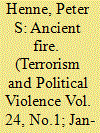

|
|
|
|
|
| Publication |
2012.
|
| Summary/Abstract |
Does religion lead to greater destructiveness from suicide terrorism? And if so, how does it influence this form of political violence? Recent analyses of terrorism point to the significance of religion, but are divided as to whether religion itself matters, or certain types of religious terrorist groups are actually driving suicide terrorist violence. This article draws on social movement theory and recent work in the study of suicide terrorism to argue that religion influences the severity of suicide terrorist attacks as an ideology groups use to justify their struggle and gain public support. This effect occurs regardless of a group's goals or organizational nature. The theory is tested using a generalized estimating equation to account for multiple attacks by several groups. The study finds that the religious ideology of a group greatly increases the number of deaths from a suicide attack, even if varying group motivations and structural factors are taken into account. The article helps to clarify the effect of religion on contemporary terrorism, contributing to the study of both terrorism and religion and politics.
|
|
|
|
|
|
|
|
|
|
|
|
|
|
|
|
| 2 |
ID:
110765
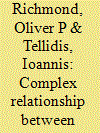

|
|
|
|
|
| Publication |
2012.
|
| Summary/Abstract |
Approaches to terrorism and peacebuilding have a complex relationship with each other, which may be explained according to four categories outlined in this article. These range from blocking each others' aims, nullifying terrorism, supporting a very limited, or a broader peace process. Each of these categories has implications for the inclusion and reconciliation of a wide range of actors and the hybrid nature of the emerging peace. This relates to the critical approach of using theory to create emancipatory forms of peace, which is used as a basis for the examination of the production of hybridity via the interaction of approaches to terrorism and peacebuilding in five cases in this article. These include Sri Lanka, Kashmir, the Middle East, Nepal, and Northern Ireland. We argue that "post-liberal" possibilities for a hybrid form of peace (which are inherent in such conflicts) offer a "post-terrorist" potential for peace processes.
|
|
|
|
|
|
|
|
|
|
|
|
|
|
|
|
| 3 |
ID:
110759
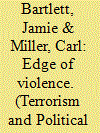

|
|
|
|
|
| Publication |
2012.
|
| Summary/Abstract |
Radicalization is often seen as a first, prerequisite step along the road towards terrorism. Yet to be radical is merely to reject the status quo, and not necessarily in a problematic or violent way. In Part 1-"Radicals"-this article compares the backgrounds, ideologies, behaviours, and attitudes of a sample of "violent radicals" with both radical and "mainstream" non-violent sample groups. By finding both what the violent and non-violent samples share, and also what they do not, the article hopes to achieve a more adept discrimination of violent and non-violent radicalization. In Part 2-"Radicalization"-the article suggests that, in addition to being an intellectual, rational, and religious decision, becoming a terrorist is also an emotional, social, and status-conscious one.
|
|
|
|
|
|
|
|
|
|
|
|
|
|
|
|
| 4 |
ID:
110762


|
|
|
|
|
| Publication |
2012.
|
| Summary/Abstract |
Dissident Irish Republicans have increased their violent activities in recent years. These "spoilers" reject the 1998 Good Friday Agreement power-sharing deal between Unionist and Nationalist traditions in Northern Ireland. Instead dissident IRAs vow to maintain an armed campaign against Britain's sovereign claim to Northern Ireland and have killed British soldiers, police officers, and civilians in recent years. These groups have small political organisations with which they are associated. The assumption across the political spectrum is that, whereas Sinn Fein enjoyed significant electoral backing when linked to the now vanished Provisional IRA, contemporary violent Republican ultras and their political associates are utterly bereft of sympathy. Drawing upon new data from the Economic and Social Research Council 2010 Northern Ireland election survey, the first academic study to ask the electorate its views of dissident Republicans, this article examines whether there are any clusters of sympathy for these irreconcilables and their modus operandi. The piece assesses whether there are any demographic, structural, ideological, religious, or party trends indicating Republican dissident sympathies. It also assesses the extent to which dissidents are seen as a threat and examines whether this perception is shared evenly across Northern Ireland's two main communities.
|
|
|
|
|
|
|
|
|
|
|
|
|
|
|
|
| 5 |
ID:
110764
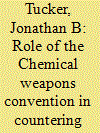

|
|
|
|
|
| Publication |
2012.
|
| Summary/Abstract |
A series of incidents over the past two decades has indicated that some terrorist groups are interested in acquiring and using improvised chemical devices (ICDs). Although the 1993 Chemical Weapons Convention (CWC) is a disarmament treaty that is legally binding only on sovereign states that join it voluntarily, the Convention fortuitously includes several provisions that can help its members to prevent chemical terrorism or to manage the consequences of an attack. This article examines the articles of the CWC that are relevant to counterterrorism and discusses how their implementation could be improved at the national and international levels. The article also addresses the role that the CWC secretariat, the Organization for the Prohibition of Chemical Weapons (OPCW) in The Hague, currently plays in preventing and responding to incidents of chemical terrorism, and the political factors that constrain its activities in the counterterrorism field.
|
|
|
|
|
|
|
|
|
|
|
|
|
|
|
|
| 6 |
ID:
110763


|
|
|
|
|
| Publication |
2012.
|
| Summary/Abstract |
This article proposes a systematic scoping review of the structural "root" causes of non-suicide terrorism. It aims to synthesize the knowledge produced on this very specific issue from 2000 and 2009 and to raise questions about unanswered issues and those that deserve more in-depth investigation. After presenting our methodology, we offer an overview of this subfield of research. We then discuss our main results and explain why no substantive argument on the structural "root" causes of terrorism emerges. We argue that the main gaps lie in the high fragmentation of this subfield, definitional problems, a somehow flexible operationalization of concepts, and a high dependence on sources of questionable reliability.
|
|
|
|
|
|
|
|
|
|
|
|
|
|
|
|
| 7 |
ID:
110760
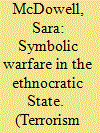

|
|
|
|
|
| Publication |
2012.
|
| Summary/Abstract |
Ethnocracies defend and protect the hegemony and territory of a dominant ethnic-nation. This article considers how paramilitary or guerrilla organisations professing to act on behalf of minority groups have used non-violent spatial practices such as memorialisation to contest the authority of the ethnocratic state and reassert their own (with varying success). Within ethnocracies where territory is fiercely contested memorialisation has the specific capacity to extend the parameters of conflict constituting a form of symbolic warfare. In exploring the nexus between memorialisation and territoriality this article reflects on the symbolic conflict between the LTTE and the Government of Sri Lanka before the former's obliteration in May 2009.
|
|
|
|
|
|
|
|
|
|
|
|
|
|
|
|
|
|
|
|
|